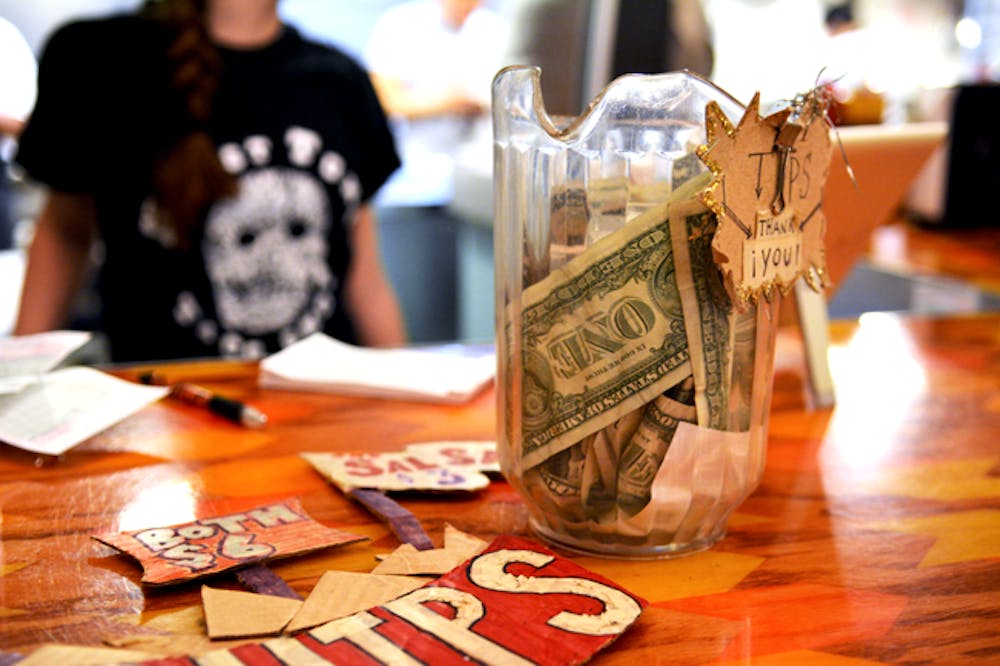It’s Friday morning. You bursar a latte at the Starbucks under Commons before dragging your way to that 11 a.m. recitation you thought wouldn’t be that bad when you signed up for it. Come noon, nothing sounds better than a steak burrito from Honest Tom’s, so you trek to 44th. A few hours later, you’re standing outside Blarney, shivering while you wait to get your ID checked. You drink, you dance, you shout over the music until the lights come on at two a.m. Once home, you call Jimmy John’s and order a Turkey Tom, which arrives at your front door 10 minutes later–the edible medal of a great night out. But who made it all happen? The barista who made your latte, the girl who rang up your burrito, the bouncer who checked your ID, the bartender who made your drinks, the delivery boy who brought your sandwich. Did you thank them? Did you tip them? Did you ever consider they might go to Penn, too?
“I could feel that people didn’t even want to talk...they thought I was a dude from the neighborhood or something,” says Chris Noble, who graduated from the College in December and has been a bouncer and bartender at The Blarney Stone since fall of his sophomore year. “When I told people ‘Yeah I go to Penn,’ they’d act surprised and ask ‘Oh really?!’”
The shock of realizing that your server is also a peer is not just reserved for a well–bearded man like Chris, who arguably looks older than the average Penn student. Shiro Githere, a petite junior in the College who works as a barista at the Starbucks under Commons has had similar experiences when, while on the job, other students overhear her talking to her friends about classes they share. “You see peoples’ demeanor change or they look surprised like ‘Wow, that’s weird.’”
In a way, it is weird: At an elite school like Penn, students from affluent backgrounds—the 58.9% who receive no financial aid—seldom have to worry about paying for their own expenses. They converge with those who come from low–income families and receive generous need–based aid meant to cover all their expenses. But what about those in the middle, who aren’t eligible for work–study or don’t earn enough from it? Even the best–paying work–study job only earns $256 for a 20-hour week. Some of these students work as servers, bartenders and baristas— and they seem the exception to the norm.
For students who serve their peers, situations can range from uncommon to awkward. “People are much ruder to me as a customer service person,” says Emma Mlyniec, a College senior who works at Honest Tom’s, “Sometimes they won’t stop texting when I’m taking their order or respond when I ask them how they are.” Uncomfortable half–waves or nods of pseudo–recognition on Locust take on a whole new meaning when you poured someone their drinks at Blarney the night before. The challenges don’t stop once the lights come on and hoards of stumbling students make their way home. “Cleanup is such a tiring thing,” says Chris, “People wreck the bar, they tear shit off the walls, people tear the flusher off the toilet so if there’s puke and shit in the toilet you can’t even flush.
For Max Hansen, a senior who worked at Jimmy John’s his first three years at Penn, the experience made him feel increasingly separated from the students for whom he was making Big Johns: “I was always bothered by the fact that there’s such a culture here of not working that all the service people around the school are assumed to have nothing to do with Penn...It was alienating more than anything.” Once, at a party his sophomore year, a girl found out about his job, news that made her “instinctively recoil and say ‘Eww!’” Maybe the girl recoiled not because she thought his job was fundamentally disgusting. Maybe the thought that one of her peers spent his evenings making sandwiches instead of preparing for OCR interviews or interning at a PR firm downtown was just too baffling to immediately grasp.
When engulfed in an environment that glorifies busy and highlights a certain pre–professional career path, service work doesn’t fit the bill of the job or internship that you “need” to sign your dream post–grad offer. But for Penn students who work in service, the jobs they need to pay their rent prepare them for the future just as well.
“Just because you’re working at a bar doesn’t mean you’re not doing cool and studious things like everyone else,” says Jenna Shultz, a Nursing senior who spent the summer after her junior year bartending at Blarney—in lieu of doing the externship that is typically expected of students in her school. She did apply for these sorts of positions, but when nothing bit she decided to combine making money at the bar with volunteering at an ALS clinic and CHOP Sports Medicine. “I like to work, I have a very strong work ethic, I like to multitask, I like to be busy and I like to be surrounded by other people, so bartending is obviously perfect,” she asserts. “It benefits me in the hospital: my people skills have just skyrocketed—dealing with drunk people teaches you how to deal with sick and crazy people,” says Jenna. She sees an enormous parallel between working as a bartender and as a nurse. When top local hospitals like Presby and HUP host their holiday parties at Blarney, Jenna also gets to network on the job. “I’m doing everything all at once, right now, by being here.”Even though ringing up burritos on an iPad may not resound as much with her future career, Emma, like many others, thinks that waitressing allows her to learn valuable interpersonal and professional skills, like dealing with difficult people and multitasking effectively. It also provides some, like James Tully, a Wharton senior who bartends and bounces at Blarney and hopes to own a business someday, with an insider’s perspective as to how they’re run.
In Max’s opinion, the majority of work–study jobs would not have prepared him as effectively for the challenges he’ll face once he enters the “real world” as a consultant in Buenos Aires this fall: “[I feel like I’ll be] able to deal with clients that are important even if everything behind the scenes is totally in disarray...I know that I can put on my game face and play it totally cool.” When he applied for the job, he felt his resumé was weak, lacking the swanky internships most Penn students boast, but he found that the majority of his interviews focused on his experience as a server and what he learned from it. Apparently, Jimmy John gives James McKinsey a run for his money on a resume.
The benefits of working in the service industry aren’t just pre–professional—for these students, their jobs and workplaces provide a much needed break from the tensions and stresses of Penn social culture. “A lot of people have their ‘safe haven,’ that one place that they go when they’re really stressed or just need to decompress, and that’s what [The Blarney Stone] has always been for me, even when I’m working,” says Jenna. When pouring lattés, Shiro finds “productive peace of mind, which is a weird thing: I’m there doing something and its not like I’m idle, but my mind gets to relax and focus on [the task at hand].”
Working at Blarney, Chris finds that he can let go of the stressful conversations that abound at Penn. It’s also a place where he feels at home: “I had been searching for that family, group feeling at Penn for the longest time and when I got it [here at Blarney] I stuck with it.” Even though he graduated in December, Chris is sticking with his Blarney Stone family until he heads to law school in the fall. Max left Jimmy John’s the fall of his senior year, worn down by the feelings of alienation and lured by the better pay of upscale dining. He now finds a similar sense of community and peace of mind as a server at Rosa Blanca, Jose Garce’s new restaurant downtown. “I love Penn but I now find peace when I’m away from it,” he says, “Well–run restaurants have a real family feel, so I get to work and even if you’ve been dreading it all day you’re like 'Man I feel great! This feels awesome!’”
Even though James loves his job at Blarney, he does not want to be a professional bartender. “I think my parents would die, especially after sending me to Wharton,” he notes. It is in that expectation of their futures and the value that a Penn education will add to their careers and lives that the tension underlying students who serve and are served lies: we come to Penn to get jobs that are “better” than bartending or waitressing. We set out to emulate what we want to be in the future, usually through prestigious internships, and try to stand out in the eyes of recruiters on campus. Yet the students who work as bartenders, servers and bouncers—whether they do so to pay their rent or just make some extra cash on the weekends—are preparing for the future as well. Whichever path we take, we’re privileged to have a choice many others who work those same jobs do not. “Even if you didn’t know I went to Penn you shouldn’t treat me differently,” says Chris. Shiro agrees: “Just because I happen to go to Penn doesn’t mean anything to anyone except another Penn kid. Treat people the same because we all have the same needs.”
You don’t have to work behind the counter to realize that.Isa Oliveres is a senior from Mexico City, Mexico majoring in english and history. She is a former Features and Food and Drink editor for 34th Street Magazine.







